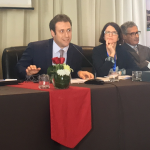New evidence continues to signal a rise in world hunger and a reversal of trends after a prolonged decline. In 2017, the number of undernourished people is estimated to have increased to 821 million – around one out of every nine people in the world. The alarming signs of increasing food insecurity and high levels of different forms of malnutrition are a clear warning that there is considerable work to be done to make sure we “leave no one behind” on the road towards achieving SDG 2. Achieving it requires renewed efforts through new and innovative ways of working and hinges on effective partnership.
Policy Seminar: Evaluation of School Feeding Programs in Egypt
Rana Sallam - World Food Programme (WFP)
As part of their longstanding collaboration on building evidence base on food security, nutrition, social protection and education, WFP and IFPRI co-hosted a seminar with the objective of sharing knowledge, lessons learned and good practices on the use of evaluation as a tool for policy formulation and capacity strengthening by MENA governments. Panelists from WFP and IFPRI researchers were joined by a representative from “Save the Children” and government officials from the Government of Egypt (i.e. Ministry of Social Solidarity and Ministry of Education) to discuss how evaluation is playing a major factor in improving the quality of implementation and programmatic performance in Egypt and to reflect on how this model could be a blue-print for the broader MENA region.


